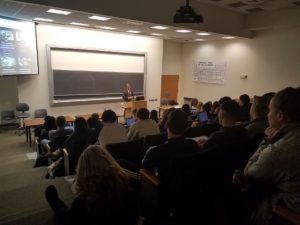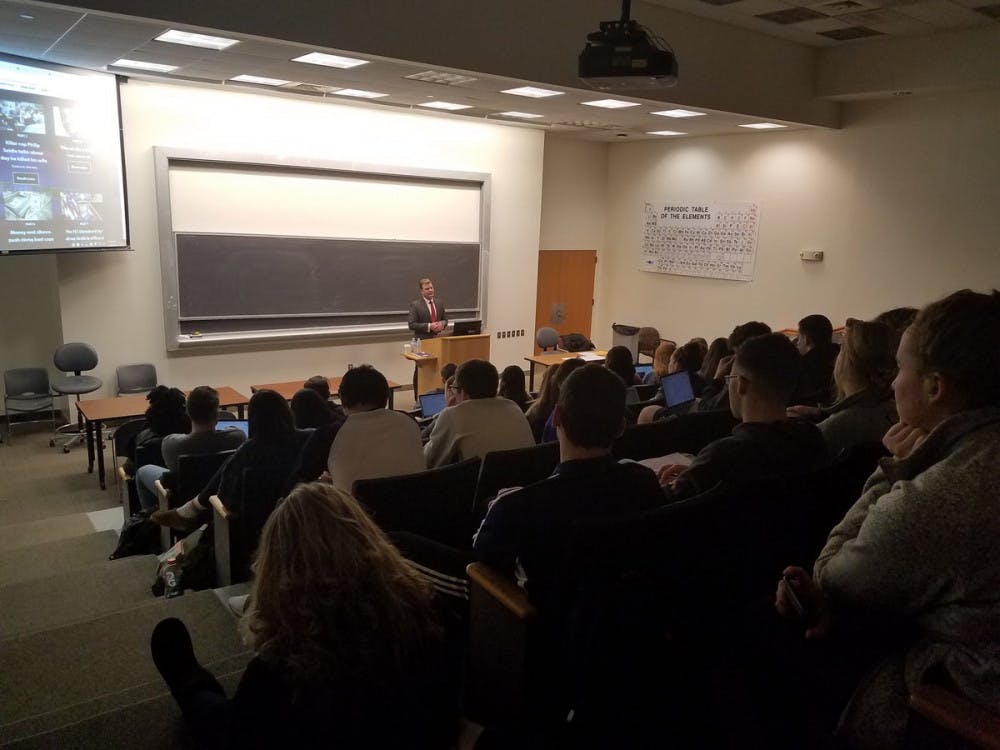By Camille Furst
News Assistant
The School of Humanities and Social Sciences, along with the Criminology Department, hosted journalist Andrew Ford from the Asbury Park Press on Nov. 28 to present “Protecting the Shield,” a project that was the product of a two-year investigation into the hidden misconduct of law enforcement across the state of New Jersey.

Andrew Ford began the presentation by discussing why this investigation should matter to the public. Over the course of the investigation involving the examination of over 30,000 legal and public records, it was found that police malpractice in New Jersey resulted in the deaths of 24 individuals and the physical or sexual harm of 137 others.
“It could be you,” Ford said.
The journalists on the story examined many situations in which police were involved in domestic abuse, sexual misconduct and the beating and killing of innocent victims. In many of these cases, the town settled the lawsuits for hundreds of thousands of dollars and the officers continued their careers –– some were later promoted.
Ford then spoke of one of the most prominent and well-known examples of police misconduct in New Jersey.
The article from the Asbury Park Press explained that the victim, Miguel Feliz, was driving home from work when he got into an accident that set his car on fire. The police who responded to the scene began kicking Feliz, who was left with four broken ribs and multiple burns.
This incident was captured on camera by a bystander at the scene. The police department responded to the video, stating that the officers were simply trying to extinguish the flames. Meanwhile, the officers involved were kept on duty after the incident.
“New Jersey failed Miguel Feliz,” Ford said. “The Press found that more than $50 million in tax funds were used to hush allegations of police abuse since 2010.” This included Feliz’s lawsuit.
Another example investigated by the team at the Asbury Park Press involved Timothy Harden, a resident of Belmar, New Jersey, who cried out to officers, “I’m gonna die,” as police held him face down on the ground at a music festival on Labor Day weekend in 2015. Approximately 20 seconds later, the officers witnessed Harden’s death.
While the county autopsy declared that his death was caused by an accident due to “drug induced excited delirium,” a private autopsy conducted by another doctor concluded the death’s cause to be from respiratory failure due to forcible restraint.
During an interview with the Asbury Park Press, Harden’s sister said that while there are many good officers, there are also “criminals that wear a badge.”
Ford expressed his sentiment on the subject, stating that the investigation team has tremendous respect for those in law enforcement, acknowledging the danger and bravery of the profession.
“The focus here was on trying to examine the system in place to make sure that officers and citizens are kept safe,” Ford said. “If I were assigned to cover NASA or education, I would be scrutinizing those systems just as closely.”
He then opened up about his personal experience in investigating these situations. He spent many late nights digging through tens of thousands of legal and public records. He said he conducted all interviews and wrote all stories involved in a straightforward manner, letting the chips fall where they may.
The team found that one of the main reasons these incidents of misconduct occur is the lacking or fragmented oversight by the higher positions in the departments.
“I wish there was more we could do,” Ford said. “I wish we could get greater access to these records that exist out there and get a sense of how individual incidents were handled and also what is being kept track of, what is not.”
Almost every seat in the room was occupied, most in attendance being criminology majors looking to pursue careers in law enforcement.
Kevin Dray, a senior mechanical engineering major, was interested learning more about police corruption.
“I was seeing (police brutality) a lot in the news so I actually came to this for that reason,” he said. “It seems that it happens on more of an individual level, which is good because it’s more of a rarity.”
After the presentation, Kyle Bailey, a junior criminology major, applauded Ford for his bravery in presenting a discussion on police misconduct in front of this audience.
“I just wanted to applaud you personally for giving a talk that’s … not highly in the positive light to a room of criminology students going into law enforcement,” Bailey said. “It’s important to be a part of the hopeful change coming.”







